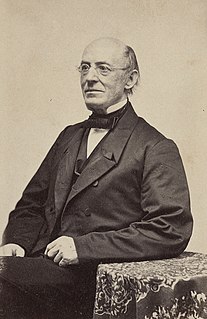A Quote by James Madison
[The Republican Party] consists of those who, believing in the doctrine that mankind are capable of governing themselves and hating hereditary power as an insult to the reason and an outrage to the rights of men, are naturally offended at every public measure that does not appeal to the understanding and to the general interest of the community.
Related Quotes
A small knowledge of human nature will convince us, that, with far the greatest part of mankind, interest is the governing principle... Few men are capable of making a continual sacrifice of all views of private interest, or advantage, to the common good. It is vain to exclaim against the depravity of human nature on this account; the fact is so, the experience of every age and nation has proved it and we must in a great measure, change the constitution of man, before we can make it otherwise. No institution, not built on the presumptive truth of these maxims can succeed.
If they are incorporated into the Constitution, independent tribunals of justice will consider themselves in a peculiar manner the guardians of those rights; they will be an impenetrable bulwark against every assumption of power in the legislative or executive; they will be naturally led to resist every encroachment upon rights expressly stipulated for in the Constitution by the declaration of rights.
The creed of our democracy is that liberty is acquired and kept by men and women who are strong and self-reliant, and possessed of such wisdom as God gives mankind - men and women who are just, and understanding, and generous to others - men and women who are capable of disciplining themselves. For they are the rulers and they must rule themselves.
Up until, really, Roosevelt, African-Americans largely voted ninety per cent Republican. That was the political origins, that's what their political voice was in the Republican party. During that history, that last sixty or seventy years of history, the Republican party effectively walked away from the community. They were afraid to really embrace civil rights even though they embraced civil rights legislation. And so it's not enough to just to put it on paper, you gotta actually show up and be in the community, and understand what that struggle was really about.
If you believe that a nation is really better off which achieves for a comparative few, those who are capable of attaining it, high culture, ease, opportunity, and that these few from their enlightenment should give what they consider best to those less favored, then you naturally belong to the Republican Party. But if you believe that people must struggle slowly to the light for themselves, then it seems to me that you are a Democrat.
You ought to love all mankind; nay, every individual of mankind. You ought not to love the individuals of your domestic circles less, but to love those who exist beyond it more. Once make the feelings of confidence and of affection universal, and the distinctions of property and power will vanish; nor are they to be abolished without substituting something equivalent in mischief to them, until all mankind shall acknowledge an entire community of rights.
Since the narrower or wider community of the peoples of the earth has developed so far that a violation of rights in one place is felt throughout the world, the idea of a cosmopolitan right is not fantastical, high-flown or exaggerated notion. It is a complement to the unwritten code of the civil and international law, necessary for the public rights of mankind in general and thus for the realization of perpetual peace.
In the history of mankind many republics have risen, have flourished for a less or greater time, and then have fallen because their citizens lost the power of governing themselves and thereby of governing their state; and in no way has this loss of power been so often and so clearly shown as in the tendency to turn the government into a government primarily for the benefit of one class instead of a government for the benefit of the people as a whole.
Our country is the world, our countrymen are all mankind. We love the land of our nativity, only as we love all other lands. The interests, rights, and liberties of American citizens are no more dear to us than are those of the whole human race. Hence we can allow no appeal to patriotism, to revenge any national insult or injury.
In proportion to the love existing among men, so will be the community of property and power. Among true and real friends, all is common; and, were ignorance and envy and superstition banished from the world, all mankind would be friends. The only perfect and genuine republic is that which comprehends every living being. Those distinctions which have been artificially set up, of nations, societies, families, and religions, are only general names, expressing the abhorrence and contempt with which men blindly consider their fellowmen.
Men by their constitutions are naturally divided into two parties: 1. Those who fear and distrust the people, and wish to draw all powers from them into the hands of the higher classes. 2. Those who identify themselves with the people, have confidence in them, cherish and consider them as the most honest and safe, although not the most wise depositary of the public interests. In every country these two parties exist, and in every one where they are free to think, speak, and write, they will declare themselves.
The republican principle demands that the deliberate sense of the community should govern the conduct of those to whom they intrust the management of their affairs; but it does not require an unqualified complaisance to every sudden breeze of passion or to every transient impulse which the people may receive from the arts of men, who flatter their prejudices to betray their interests.




























